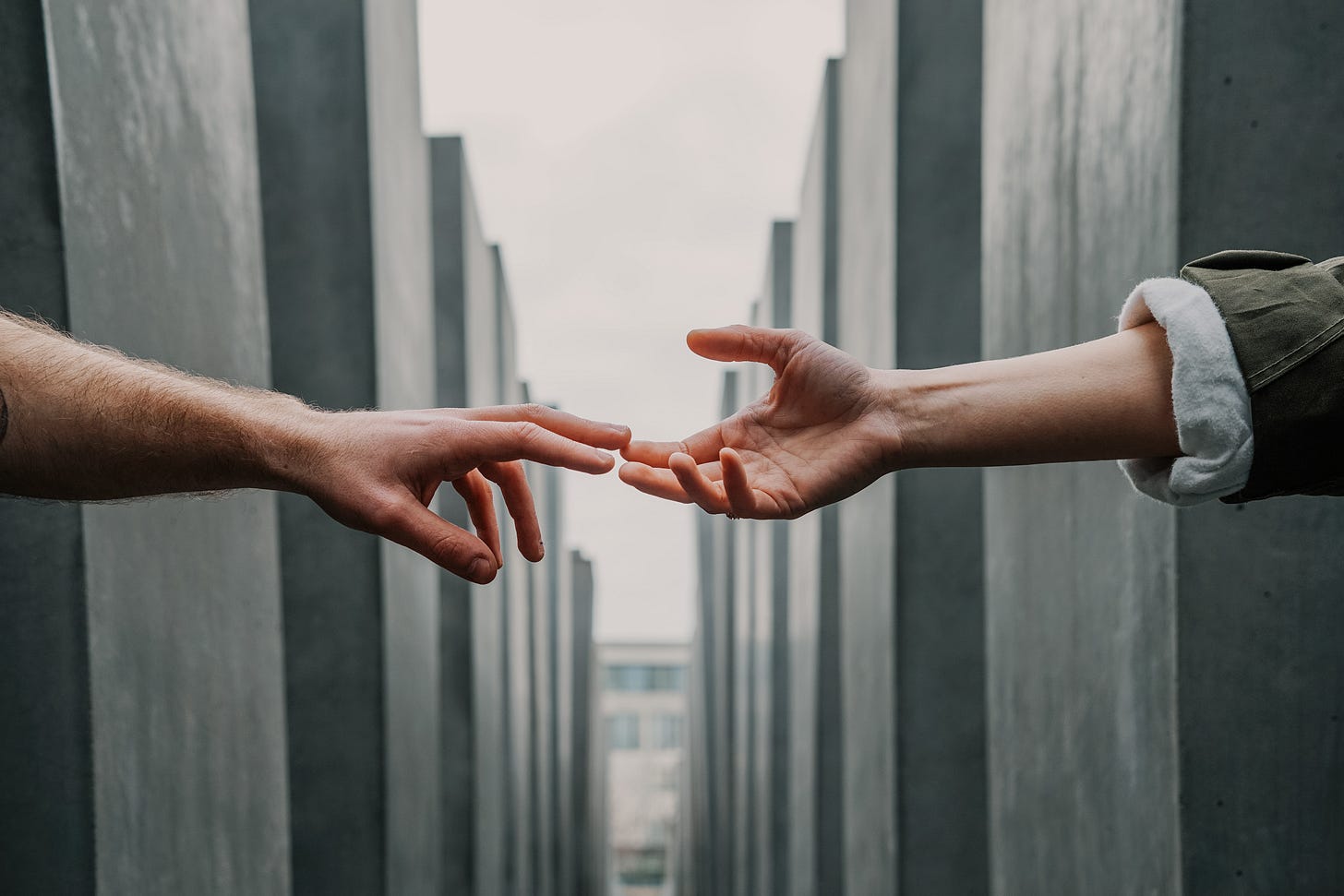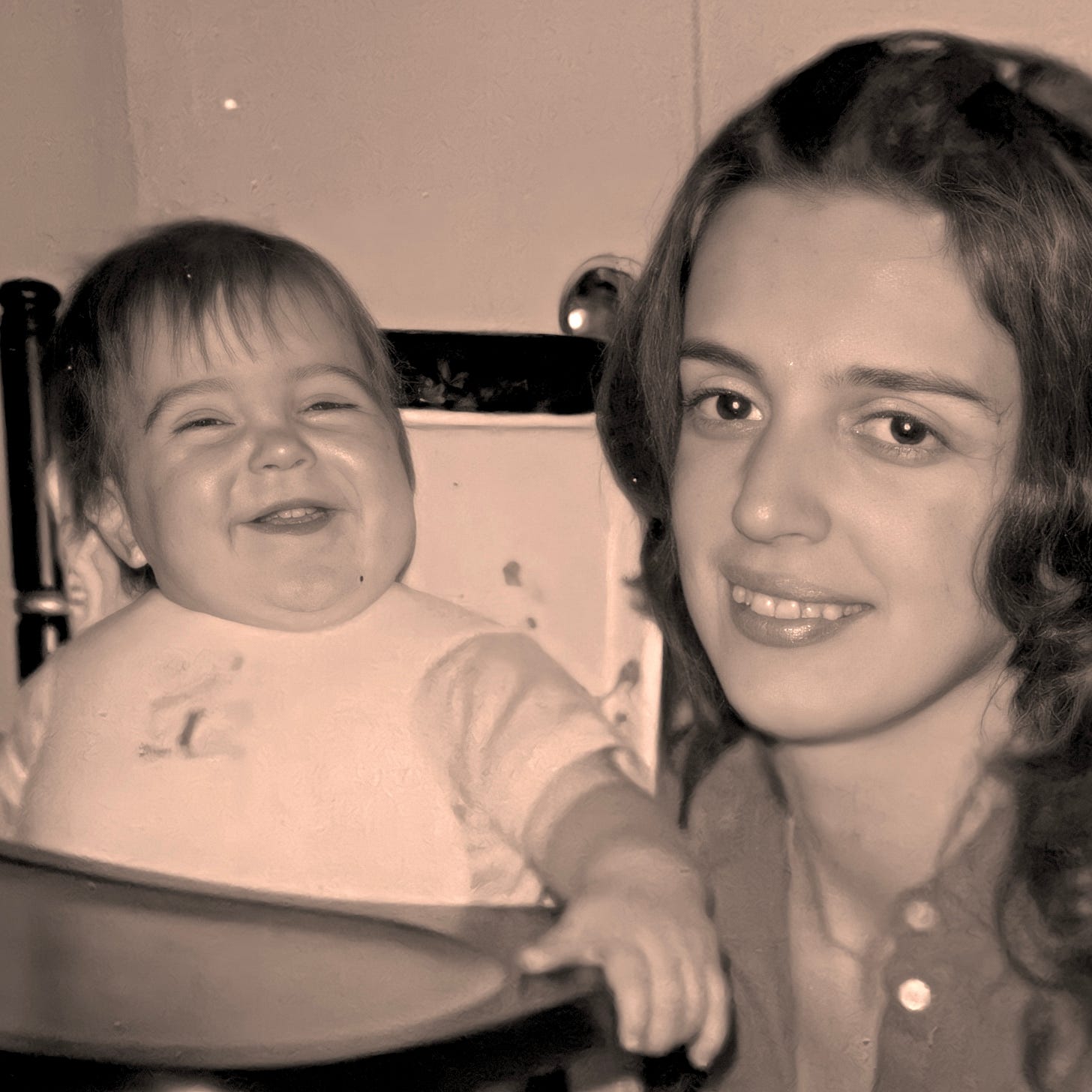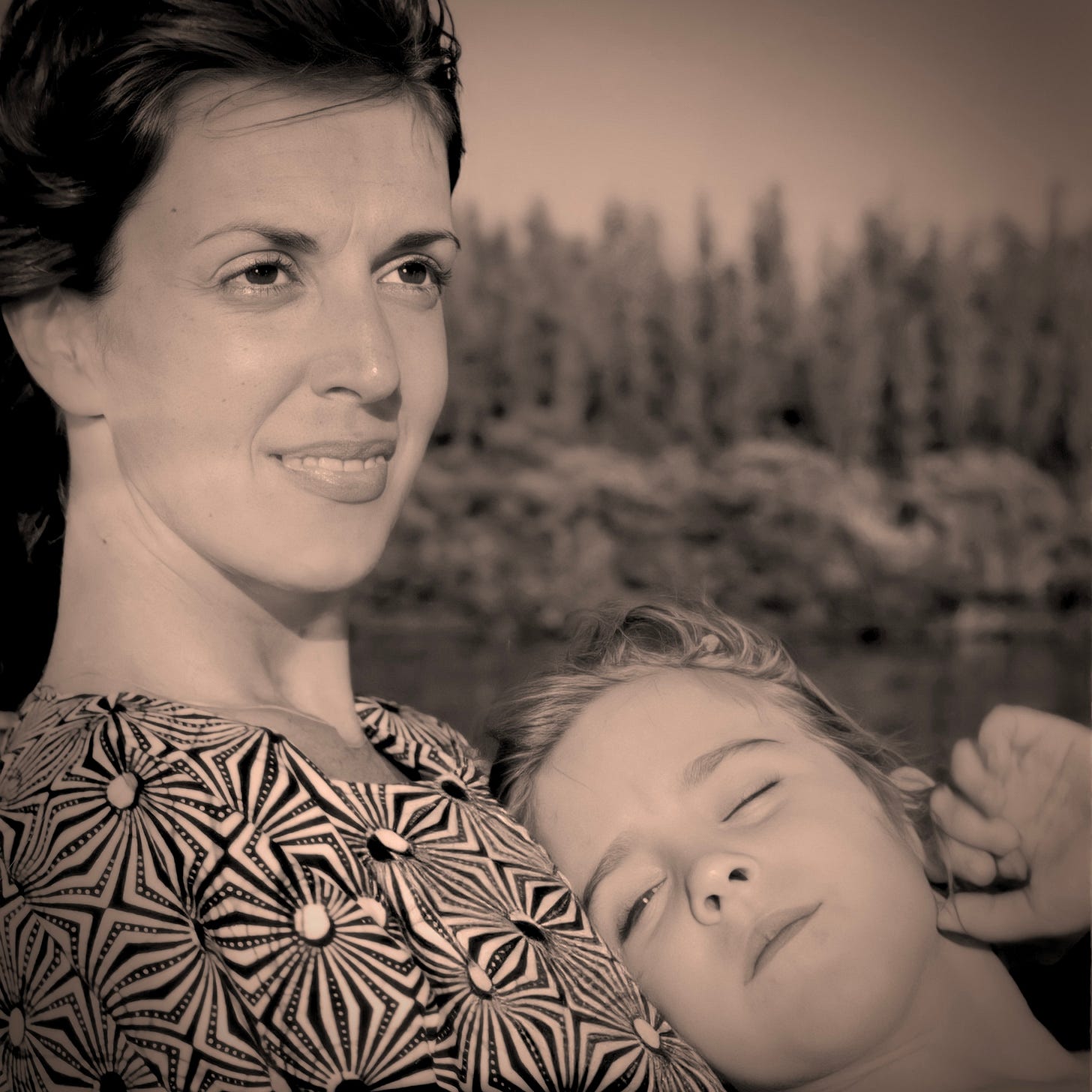The Space Between Us
Understanding the third thing
Years ago I began dating a man who pursued me, came on strong, said he was in love with me, and could not have been more thoughtful or caring those first few months. When an ex boyfriend showed up at my door in the rain with a ring to propose, my current boyfriend told me it was good I’d said no, because I was the one for him. He was in my face and in my space and said and did all the things a person says and does when they’re in love. I thought this was it, because I was in love, too. As soon as he “had me” though, things started to change. Once in a while he’d say something so cutting and critical it would take my breath away. I would feel like I’d been punched in the gut. Sometimes he’d get dark and his mood would suck the oxygen out of the room. I’d try harder. The relationship took on its own energy - when he was sweet to me, I’d be riding high. When he was mean or unreachable I’d feel bereft and alone. If he was unhappy, I’d chase and try to make things better. If he was feeling good, I’d take it as a sign everything was going to be okay. I was certain if I could just love him enough, his sweet side would overtake the parts that made it painful to be with him, and he’d be happy. We’d be happy. You can probably guess how it ended, the details don’t matter. Just fill in a lot of not-pretty images and nights spent sobbing. When it was over I was devastated and heartbroken but also relieved to be on the outside of all that turmoil and occasional violence. I could breathe again.
Not long after, I was at a private screening of a film about Imago Therapy. The main idea in Imago Therapy is if you and I are in a relationship, that relationship does not exist inside me or inside you, it exists in the space between us. We are co-creating this third thing - our relationship - and we are each responsible for what we contribute. If I put my rage in the space between us, or my unwillingness to communicate, if I offer up my list of ways I’ve been hurt in the past or reasons why things aren’t going to work out, at least two things are true. One - it is not going to go well between us, and two - you can’t do anything about what I decide to bring to the mix any more than I can manage what you put into that space. What I love about this is that each person is responsible for what they’re bringing to the table. I also love the potential there, the clean slate, the unknown, the possibility of creating something incredible with another person. If I bring my excitement, curiosity, willingness to listen, desire to really know and understand you, my sense of humor, vulnerability, empathy and patience to the mix … and you do the same … how wild and fun is that going to be? I remember sitting there in the dark room at that screening feeling like all the lights had gone on. It changed the way I approach relationships, and not just romantic ones.
To me, the most exciting thing about being human is that we are in a relationship with everything, all the time. We relate to those closest to us, of course, but we also relate to people we meet in passing. I get to decide what kind of energy I’m going to bring to the space between me and the person who works behind the counter at Thyme Cafe, even if our relationship is only two minutes long. Maybe that person will be having a rough day and I won’t get much response back, or maybe if I mean it when I ask how they are and then listen when they answer, it will restore their faith in humanity for a little while. It restores my faith in humanity when someone lets me merge in traffic, or holds a door open - it really doesn’t take much. Just like it can really suck the life out of you if someone is rude. Enough small, disappointing experiences with other people in a day can really affect the way you feel if you aren’t managing it, so there’s no doubt the way we’re all relating with one another has a huge impact. There’s also so much potential if you start to think about your relationship with time, money, nature, your own body, and your work, whatever it is. When I think about how I’m relating to the world at large, and to particular circumstances as they arise, and that I have choices about what I contribute to any relationship I’m in, I feel like I have a lot more power than I do when I perceive what’s happening as something that is happening to me. I no longer feel besieged.
As someone who grew up with a mom who had a lot of expectations, this way of thinking about relationships was pretty life-altering for me. As a kid, I didn’t feel like I had any power. I also felt like I might be broken and unlovable, so if there were expectations, I tried to meet them, unquestioningly. I loved my mother to the ends of this earth, but she was an alcoholic who would not admit she had a problem, and if you’ve ever loved an addict, you know how heartbreaking it is. My mother also unleashed her rage and frustrations on me when she drank, and as a child it was terrifying to watch her personality change, to see her beautiful face get twisted into something wild and ugly, to see her eyes flash at me like someone who might hurt me, or worse, someone who wanted to hurt me - it was a lot to take and impossible for me to understand at seven, eight, nine - even at sixteen when I reached her height and fought back, it was still hard to fathom. As confusing as it was to try to make sense of all that, by far the hardest thing was that she expected me to act like none of that was happening. She wanted me to treat her like she was a wonderful mom - and there were times when she was - but everything was colored by the drinking.
As I got older and began to understand that she was an alcoholic no matter how much she and everyone around her denied it, my expectations of myself changed. After almost two decades of being gaslit about this issue, of feeling certain she had a problem and needed help, but being told she was fine and the problem was my perception that she had a problem, I’d had enough. It’s hard to describe exactly how crazy-making it is to be the target of an alcoholic’s rage, especially when it’s your mother, to suffer the consequences of that rage, and to be told again and again it’s you with the issue, not her. I’d realized I needed to have boundaries if I was going to survive, and those boundaries included not being around her when she drank. I also gave myself permission to figure out how close we could be given that she wouldn’t admit there was an issue, and a whole history between us that really hurt. Prior to that, I’d been forcing myself to live up to her expectations that I would accept her version of reality, which was that she had been great to me. She loved me - I know that now as a grown woman - but she was not great to me. Nonetheless, if I behaved as though she had not been great to me - by, for example, not being willing to put myself in a situation where she’d be drinking and I wouldn’t have an escape route - she’d be angry. It wasn’t okay for me to need boundaries, because I was expected to tow the line and pretend boundaries weren’t needed. Why would I need boundaries if she wasn’t an alcoholic?
Once I became unwilling to accept a false version of reality, things became fraught between us. She would not bend, would not look at her own behavior and contributions to our relationship over the years. She wanted to edit out everything except the ways she showed up for me and did come through. Anything negative was supposed to be left on the cutting room floor, but that stuff was like weeds. It was all over me, and all over her and all over our relationship. I needed to face reality as it was and deal with it head-on. My mother needed to deny reality. Her needs and my needs were counter to one another and it made everything impossible. Finally, I moved 3,000 miles away. Now there was some space between us that I could contemplate and work with, where before the space between us had been blocked out by a strange mix of love, rage, disappointment, resentment and too many unsaid things. I didn’t know about Imago Therapy at the time, I just knew we needed to disentangle. So much of who I was as a person - the way I grew, the things I thought about myself and the world - was because of who she was. I needed to figure out where she ended and I began because our relationship had been living inside of me whether I knew it or not.
Once we had that space things got better. I could figure out what time of day was best to call, and avoid evenings in New York when the chardonnay would be flowing. Mid-morning in Los Angeles was usually a good time to call for both of us, and we’d talk at least a few times a week. We texted daily. She’d visit twice a year and I’d get back to New York at least once, usually twice. It wasn’t perfect - trips always involved at least one night when she’d get drunk and I’d have to figure out how to manage, or she’d occasionally text while drinking and say something hurtful - but it was a lot better.
It also gave me the space to consider what I owed her as her daughter, what she “deserved” and whether any of that really mattered. When you separate yourself from the relationships you’re in and consider them as a third and separate entity between you and the other person in the mix, it gets so much easier not to take things personally. My mother was twenty-four when she had me, and she’d been through some trauma in her life. Her dad died suddenly when she was thirteen, her mom when she was twenty-eight, her brother when she was forty-one. My dad broke her heart and left when I was four. She didn’t have an easy time and she was not one to ask for help. As a result, a lot of her heartache was not processed, so she drowned that stuff in chardonnay and raged at me. It really had nothing to do with me, it had to do with her. It affected me, it scared me, it shaped the person I am and the way I felt about myself for a long time. I certainly thought it was about me as I was growing up, and I believed I was broken and unlovable for many years … but her failings as a mother were not a reflection of anything lacking in me, the lack was in her. She probably could have overcome a lot of it if she’d gotten help, but she didn’t. When I hit my mid-twenties I was so bored of myself. So bored of poring over all of this history, so tired of pointing fingers and blaming my low self-esteem on my parents. I really had this moment of realizing after twenty-five or so, whatever was or was not happening in my life was on me, not them. If I was going to be miserable and allow myself to get drawn into painful relationships, that was on me. If I was going to start making better and different choices, that was on me, too. And if I needed help figuring out how to make better choices (and I did) I was going to find it.
Instead of thinking about what my mom deserved or what I owed her, I just started focusing on who I wanted to be in the relationship and how I wanted to show up. It didn’t really matter what she had done or not done. It certainly didn’t matter anymore when she got sick. It didn’t matter with my dad, either. When he turned ninety-five and my half sister had a stroke and didn’t survive, I suppose I could have said he was a terrible dad and he deserved to stay in Georgia on his own and figure out his care with the people at the assisted living facility, but I don’t think I would have liked myself very much if I’d done that. I’m in a relationship with myself, too, and it’s probably the one that matters the most, because if I don’t like myself that’s going to infect every other relationship I have. Have you ever hung out with someone who doesn’t like themselves? It isn’t a lot of fun, and if you stick around they’re just going to look at you like you’re crazy for liking them, and probably treat you badly to boot.
If I think back to the guy who pulled the love-bomb bait-and-switch, I have no doubt that the experience would have been a lot less painful (and the relationship a lot less long) if I’d been thinking about relationships this way. If someone is coming to the table with a lot of pain they want to fling into the space between you, you don’t have to sit there, scrape it all up and work with it. You don’t have to swallow their ball of unmet needs and try to fix them by being loving, kind, patient, amazing or perfect. It won’t work, anyway. I have standards for how I want to be treated in any relationship, and standards for how I want to show up. There are certain people I don’t want to co-create anything with, and others where the space between us feels so charged and full of love, memories, laughter, hugs, understanding and entire conversations that can happen with just a look, I can’t believe how lucky I am. There may be times in a long term friendship where one person or the other may have to keep the “third thing” safe because someone is going through a crisis, and others when one person devalues the relationship and all you can do is walk away with your memories, but the exciting thing is that there’s always space and you never know who or what might show up in that space. As we head into a new year, may we all consider what we want to contribute as we travel, and may a little magic show up in your path.
If you’d like to meet me in real time to talk about the idea of a relationship as a co-created “third thing” and the power, freedom and ease that creates, I'll be here 12/29/23 at 11:15am PST or you can wait for the Come As You Are podcast version. And if you’d like to meet me in Portugal in June, I would love that so much. Happy 2024 to all.





This is helpful truly...it really does get better
Sending a hug across this virtual space. I also grew up with alcoholism and I also experienced a toxic romantic relationship that went on far longer than it needed to in my mid-20s. The part you wrote about not knowing where your mother and you began, ran deep in my core. Although my mother was not the alcoholic in the household, similarly, she unloaded so much on me- many things related to the alcoholics- that I was just there to serve her as her fixer of things and her therapist of sorts, if a 12 year old could be a therapist. It took me a little longer than you to realize what was happening (late 20's/ early 30s) and to slowly implement much needed boundaries that were needed if the relationship were to survive. I am still learning about who I truly am (which is also a struggle for adult children of alcoholics). I loved how you handed things over to an invisible space, because it is healing to not have to be the one to carry everything. I will certainly look into Imago therapy.
One thing that has been on my mind in regards to that toxic relationship I mention was attachment personalities. I was realizing the other day that my ex appeared to give off behaviors of someone who developed either an avoidant or disorganized attachment style (and given what I know about his upbringing, it would make sense) and meanwhile I hold an anxious attachment style. This combination was harmful for me. He was warm and then frigid the next day, and it was when he was cold that I would try to find ways to get him back. Due to my own upbringing of being emotionally neglected as a kid. A not pretty cycle. Thankfully, I have done a lot of work on myself since then and continue to do so. Anyways, I thought of that very ex as I read the description of of yours and wanted to share a working theory =) Have a great holiday.